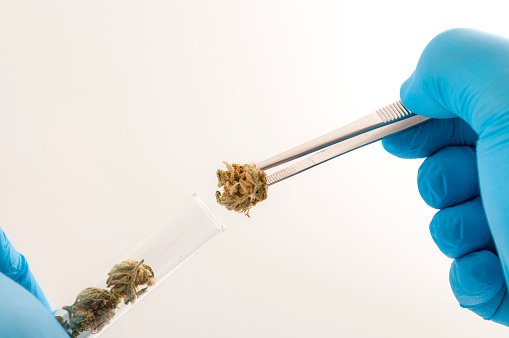Everything you need to know to become a cannabis nurse
These days when it comes to nursing specialties, if you can dream it, you can do it. That’s one of the greatest things about our profession!
One emerging field that has followed legislative trends is cannabis nursing, or cannabis therapeutics. Cannabis nurses largely fill educational roles, and work in a variety of settings ranging from wellness clinics to dispensaries. Currently, two major nursing associations—the American Cannabis Nurses Association (ACNA) and the Cannabis Nurse Network (CNN)—exist to support this emerging (and still largely unrecognized) specialty.
In just the past decade, public opinion of medical marijuana has become more tempered, and trends in legalization have followed this shifting tide. The therapeutic properties of cannabis continue to be discovered, and as a result, job opportunities for cannabis nursing are growing as well. The following article outlines trends in the world of cannabis therapy, the role that nursing plays, whether or not cannabis nursing would be a good career path, and finally—how to pursue job opportunities in the field.
Would cannabis nursing be a good fit for me?
If you find alternative health trends innovative, cannabis nursing is one of the fastest growing aspects of this sector. Cannabis nurses have the opportunity to help their patients find relief in non-conventional treatment modalities, but to do so, they must be comfortable working in a setting that is constantly being updated with new information. Nurses already interested in medical marijuana would likely find evolving practice guidelines stimulating and exciting; however, nurses that feel more comfortable working in traditional and established roles might find this type of ever-changing environment overwhelming.
Having the ability to stay current with the research means that cannabis nurses must have the ability to independently pursue evidence-based knowledge in their field. The aforementioned nursing associations are great places to start for reliable information (and even CEU credits). As the CNN puts it, cannabis nurses must have “understanding of the Endocannabinoid System and Cannabinoid Therapeutics,” and a willingness to make “major impacts within the healthcare/legal systems and wellness/cannabis industries worldwide.”
Nurses—already considered to be one of the most trusted professionals—are perfectly aligned in introducing cannabis therapeutics to their patients, especially ones who are hesitant. Many cannabis nurses are introduced to this field by being a patient first. Having first-hand knowledge of medical marijuana’s therapeutic benefits helps to dissipate much of the distrust and stigma about using “drugs” that some patients get hung up on.
How do I become a cannabis nurse?
Just like any type of nursing, cannabis nurses must hold an active license. Nurses with experience in holistic care, hospice, or wellness clinics will have an advantage in what to expect when working in complemental modalities. That being said, nursing education specialized in cannabis therapy is necessary to work in this field.
Currently, several programs exist online that can provide this type of training. Since cannabis nursing is in its infancy, and a trending field, nurses interested in pursuing it need to be careful in vetting out potential training programs. A good place to start is at Radicle Health, a self-paced online curriculum designed by Eloise Theisen, AGPCNP-BC, the current president of the ACNA. Among her other accolades, Eloise has extensive experience treating thousands of patients with cannabis, and has created one of the first dosing guidelines for cannabis practitioners.
Another program of study for potential cannabis nurses is offered by the Pacific College of Health and Science. Or, if you’re not quite ready for official enrollment, a great place to learn more about cannabis nursing is by checking out cannabis conferences designed for healthcare practitioners. Several hold annual gatherings: CNN’s conference is designed specifically for nurses, while the The Emerald Conference touts itself as “the original, longest running interdisciplinary cannabis science event. It is the forum for discussion on discovery science, as well as how science and data support best practices in cultivation, production, and quality assurance.”
Currently, no official certification exists for cannabis nursing subspecialties, so beware of any programs that claim to provide this. That being said, with the rise in popularity of both cannabis therapy and the need for nursing expertise in the field, certification shouldn’t be too far off. As with many new therapies, mainstream acceptance often outpaces governing law, and by extension, official nursing guidelines. As of now, cannabis nursing is not (generally) part of basic nursing curriculum, nor do questions about its use appear on the NCLEX.
Cannabis nursing’s popularity and obvious trajectory, however, has not gone unnoticed. In an effort to close this gap, the National Council of State Board of Nursing has recently put out nursing guidelines for medical marijuana therapy. What’s more, they have officially recommended that accredited nursing schools include teaching on the endocannabinoid system.
Finding employment in an emerging field of nursing is difficult. Nurses interested in this field must be willing to look outside the box, immerse themselves in self-directed education, and pursue indirect ways of becoming involved. Any way that you can position yourself as a knowledgeable cannabis nurse resource will undoubtedly lead to making the connections necessary to land this type of role.
Another aspect of cannabis nursing to consider is on the advocacy and legalization frontier. If this side of cannabis nursing interests you, check out the work that the Coalition for Medical Marijuana is doing! And if the perfect role doesn’t seem to exist? Create it! Many cannabis nurses have an entrepreneurial streak and work as cannabis consultants, health coaches, online educational providers, or even open their own nurse-run dispensaries.



